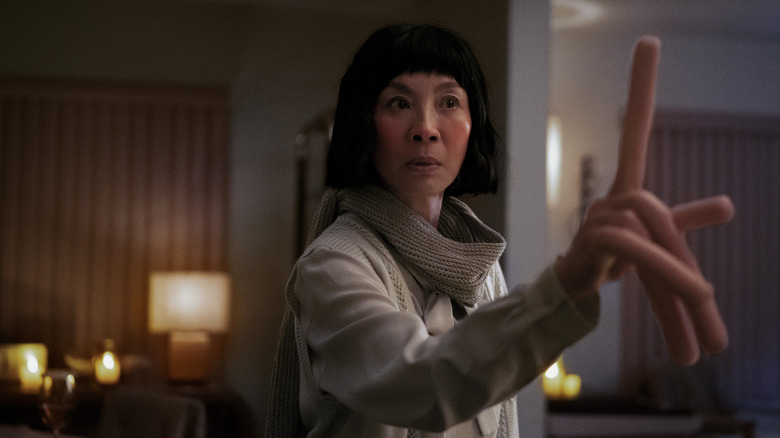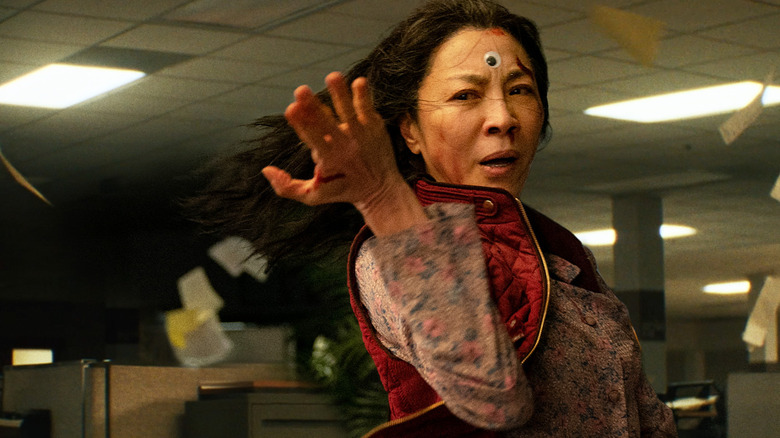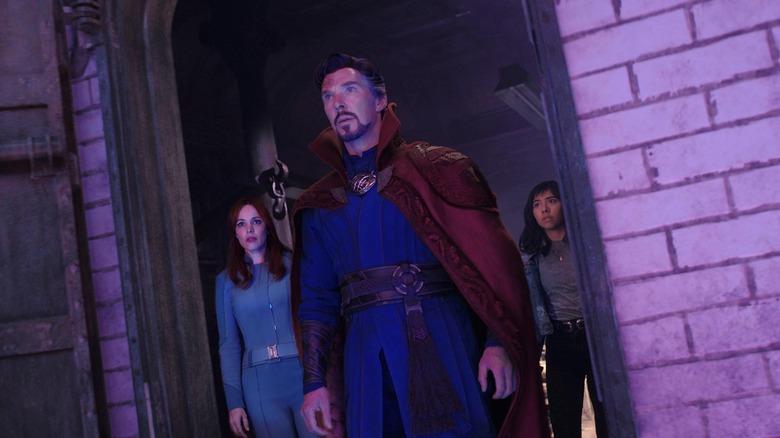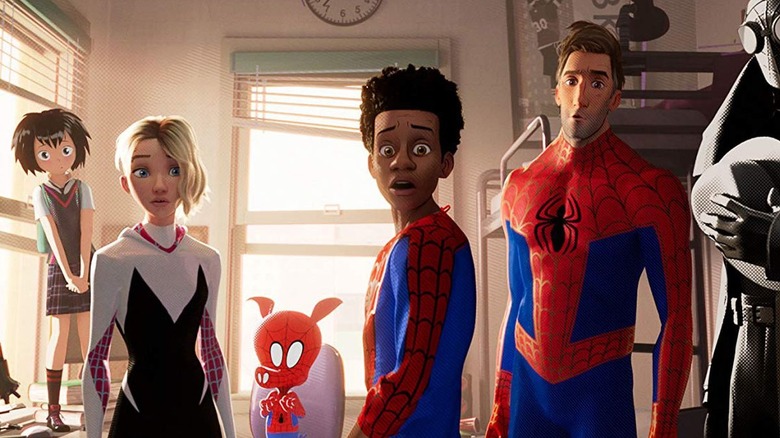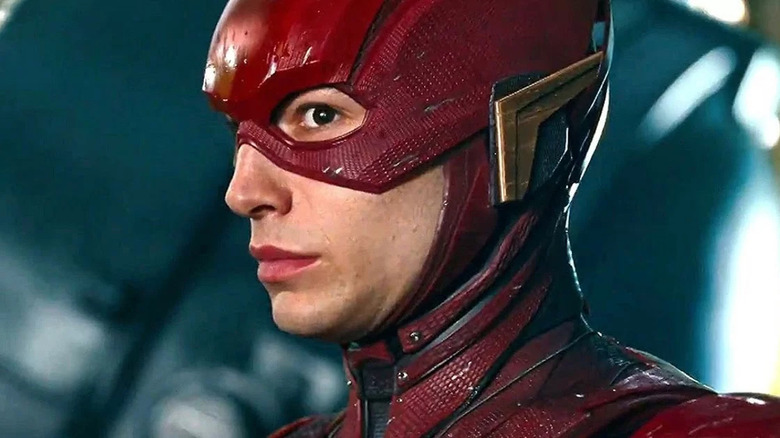Doctor Strange, The Flash, And Everything: Why Now Is The Moment For Multiverse Films
Multiverse storytelling is nothing new, but it sure seems like it's having a moment. Several wildly popular movies and television shows have featured multiverses in the past few years, with even more due to hit theaters soon. Whether it's the animated antics of "Into the Spider-Verse," the heartfelt wackiness of Daniels Kwan and Scheinert, or the Marvel mayhem of "Doctor Strange in the Multiverse of Madness," there's more than enough multiverse media to go around. But why now? What inspired this incredible influx of dimension-hopping fun, and will it slow down anytime soon?
Given that the concept behind multiverses is ancient — think Greek philosophers chatting in a salon — it's hard to imagine we'll see an end to multiverses in the movies. When reality becomes too much to bear, the idea of an alternate universe is ridiculously comforting, so there's no surprise that we have so many of these stories now. The pandemic, political strife, restrictions on human rights, threat of global warming, and war in Ukraine are all constant threats and stressors, and it's difficult not to feel a little trapped and hopeless. If there's one thing a multiverse is good at creating, it's hope.
Infinite possibilities
While philosophers and scientists have debated multiverse theory for centuries, the pop culture version we know today originated in DC Comics' "All Star Comics #3" in 1940. Most fictional multiverses operate under the assumption that there are infinite versions of the same timeline, all existing concurrently. The concept can be used to great comedic effect, like in the intergalactic cable episodes of "Rick and Morty" or the hot dog finger universe of "Everything Everywhere All At Once," but it can also be a tool for storytellers to explore whatever possibilities they can imagine.
It also helps loosen up the rules a bit with regards to repercussions, because as long as the hero can continue to hop universes, the story will go on. There's something freeing about that escapism, which feels like a throwback to the storyline-hopping silliness of 1990s shows like "Quantum Leap" and "Sliders," where serialization was less than an afterthought. Life is serialized enough; we're all trapped within linear time, and every moment is dependent on what comes before and after. Freedom from the cycle, even when it's fictional, is honestly a joy.
Infinite chances
Feeling like things are out of control is terrifying. In Sam Raimi's "Doctor Strange in the Multiverse of Madness," both Stephen Strange (Benedict Cumberbatch) and Wanda Maximoff (Elizabeth Olsen) are desperately grasping for control: Strange wants control over his life, while Wanda wants to control everything. They're both searching for control because they've been hurt and either want the pain to stop or don't want it to happen again. But their journeys through the multiverse show them that no amount of control over the future can fix the past.
Back here in the non-Marvel Cinematic Universe, we don't have ancient magical books or peppy young superheroes who can help us jump dimensions, but we can use the lessons learned in our own reality. Life is chaos. No amount of planning can prepare a person for everything, and it's impossible to control every situation. We have all been through a collective trauma in the past few years as we process the chaotic and ever-changing world around us, and people are searching for control, or a return to the past, just like Strange and Wanda. We can't go back, only forward, and Raimi's film encourages us to do so while recognizing that sometimes life is simply mayhem and you just have to go along for the ride.
Infinite friendships
The proliferation of the internet has made global communication easier than ever before, but instead of making the world feel closer together, it can sometimes feel even more isolating. Seeing other people's lives as reflected through social media can make anyone feel left out and alone, and the necessary seclusion of the pandemic has made that loneliness even more acute. It's not surprising that the majority of the multiverse-set stories in recent years have focused on how our relationships with other people are vital to surviving when things get tough.
In "Into the Spider-Verse," Miles Morales (Shameik Moore) is overwhelmed and feeling horribly alone with his spider-powers when he meets a whole bunch of other spider-people from alternate universes. They all understand the unique situation he's in intimately, giving him the kind of friendships he needs to grow. Similarly, the completely exhausted Evelyn (Michelle Yeoh) in "EEAAO" goes on a journey of self-understanding that is deeply intertwined with the fates of her family, and she similarly realizes that the most important weapon against chaos is kindness.
Infinite futures
The multiverse films of the past few years have largely focused on making something positive out of a bad situation, so here's hoping they can transfer some of that energy to "The Flash." DC's upcoming film is supposed to open up the DC multiverse, crossing over with the Tim Burton Batman movies, but the film has been plagued with problems including a streak of destructive and illegal behavior by star Ezra Miller. They have entered treatment for their mental health concerns and have issued an apology, but the future of "The Flash" is still somewhat uncertain.
On the other side of the comic book universe, Kevin Feige and the folks at Marvel have decided that the next major arc of the MCU following the "Infinity Saga" is the "Multiverse Saga," so fans can expect loads of multiverse mania in the coming years. Our own world will continue to be chaotic and frustrating, and we will all likely look to the magic of multiverses to help us escape and remember what's worth fighting for in our timelines.
The most important thing to take away from all these movies and all their multiverses is that we're all just trapped on this wild ride together. No one has any idea what they're doing, no one has all of the answers, and we're all at least mildly terrified. In the words of the late, great Michelle McNamara: "It's chaos; be kind."
